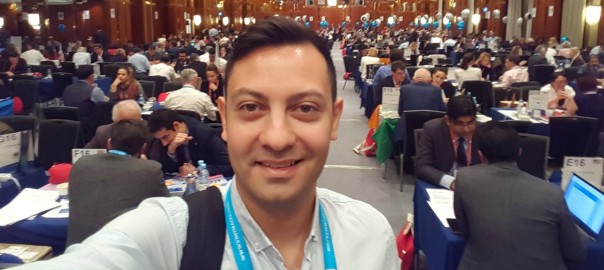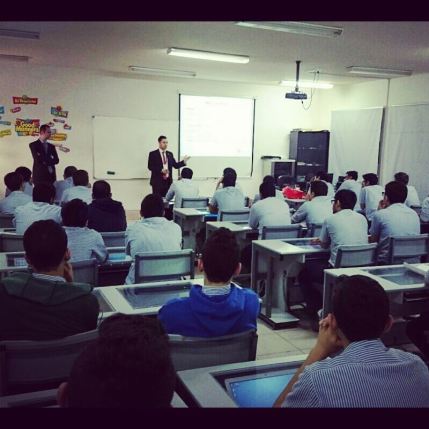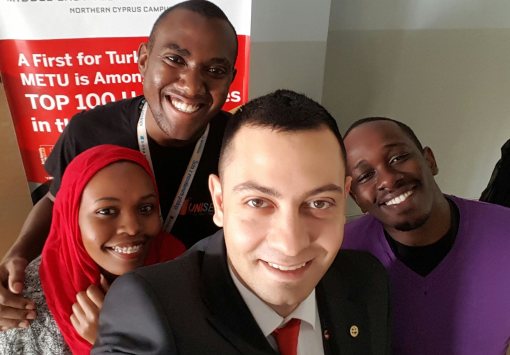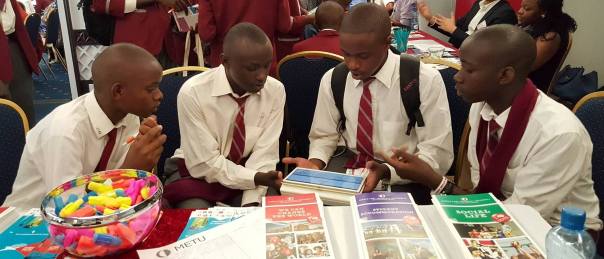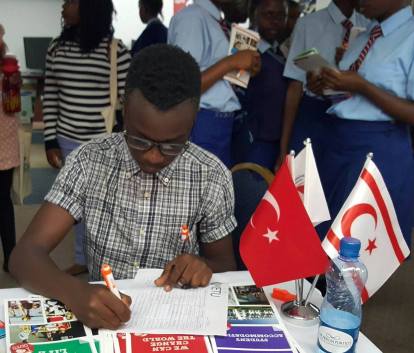I had the pleasure of attending ICEF Berlin, which took place at the Intercontinental Hotel between the dates 30th October -1st November 2016. For those that don’t know, ICEF stands for ‘International Consultants for Education and Fairs’, and they have been in the business of connecting educators with education consultants from around the globe under one roof since 1991. Today, they have grown significantly and gained immense respect from higher education institutions around the world for their involvement, contribution and dedication in encouraging international student recruitment. Their years of expertise has also led to them establishing a source of valuable information which all those interested or involved in education including myself love to follow; ICEF Monitor. The list of services provided by them goes on from agent training to course finding services for students and educator development, ICEF continues to grow and expand in the education field.
Working in the field of student recruitment myself, I had always heard quite a lot about ICEF as my colleagues and director had previously attended many times and we had indeed recruited some very good agents from the event. This year, I gained the chance to attend and see what ICEF was really about, while also on the hunt for some good agents that would help bolster my institution’s student numbers from new markets, primarily Africa. From what I have been told, despite having workshops in many countries around the world at different times, ICEF Berlin is the main event worth going to for agent recruitment. Perhaps the central geographical location of Germany is what attracts institutions and agents as well as others from four corners of the world to this event.
If you are especially:
- New to the field of international student recruitment
- Any type of institution involved in education
- A newly established company focused on education consultation (Agent)
- A new company involved in education technology
then I believe that you will find this article useful. I wanted to give an honest review about my experience of the event to those that have never attended or are considering attending, so here is my review of ICEF Berlin 2016 and its 30 day post evaluation.
Correspondence with ICEF
Getting in contact with ICEF for participation is very straight forward. Email correspondence with the ICEF team was very smooth and prompt. Every question that I asked was answered in a very helpful manner. The level of professionalism was at the top level as expected. Additionally, when at the workshop, the representative I was always in contact with (Ms. Seher Neöz) was very kind enough to come meet me and my colleague and get our feedback about the event which was very pleasing.
10/10
Registration & Participation Fee
Registration was fairly simple. Every participant has a profile which they must fill. There are word limits to each paragraph when giving information about your institution; therefore, it is important to be efficient and give the vital information that will attract or convince your prospective meeting partner that you are a good contact to have a meeting with. For event participation, the price may sound steep at first. A total of 4,400 EUR for participation and an extra of 2,400 EUR for a second representative. The fact is, if you do actually manage to get an agreement with at least one good agent out of a possible 30 meetings, then the cost of participating at this event can be covered by even 1-2 students that you recruit from them. As an institution or a company that will attend, it is important to make sure you send a representative that is social, willing to meet new people and is able to set up a good working relationship not only at the event, but after the event with constant follow up, too. Additionally, I would advise you to attend with 2 representatives as you will be getting double the number of meetings which will increase your chance of establishing some good partnerships for your institution. The fee also includes one full day of workshops which really does keep you up-to-date with the latest trends and perhaps may inspire you with new ideas for your future marketing strategies. Despite all this, the fee still can be a turn off especially for new start up agents or institutions on low budgets.
8/10
Arranging Meetings with Prospective Agents
ICEF have been very successful in integrating technology in their methods to help event attendees set up their meetings fast and efficiently. The software that was used (Marcom Onsite) was user friendly and ICEF provided a user manual for it. I must admit that I only had a quick glance through the manual and that was enough to arrange my meetings and select the workshops I wanted to attend. However, for older users this may not be the case. The font in the system is very small and it is easy to miss something. For example, I arranged my workshops that I would attend at the last minute, because I didn’t notice the button that leads you to select them. Perhaps some sort of reminder could be established in the system for the future. The earlier you register and begin requesting appointments the better it is to fill your schedule. My schedule was fully booked in about a month after registration (Early September). In total, I had arranged 30 meetings across 2 days. Each meeting lasts around 25 minutes, depending on the conversation. Overall, for a first timer, arranging meetings was very simple.
9/10
The Venue
The event was hosted by Intercontinental Hotel in Berlin. This 5 star venue really does give its guests 5 star hospitality. Nothing could be faulted in regards to service. The event organisers were also very clever to keep the guests apart to avoid crowding by having 3 different lunch, desert/fruit and tea stations situated around the event. The hotel itself is in a central area, so staying in another hotel nearby is no problem. As a first timer attending and visiting Berlin myself, I first considered staying at the host venue. However, the price of accommodation was just too expensive, despite getting special rates from ICEF. It is recommended that a nearby hotel at a much more suitable price is preferred. I opted to stay at the RIU Plaza Berlin, and paid almost half the price of what I would have paid for the Intercontinental Hotel. The event venue was only a 10 minute walk away which was very convenient.
Additional tip: Exchange your money to Euro before arriving to Germany as many hotels (4 Star) refuse to exchange currency. As always, my credit card ran to my rescue!
9/10
Meetings with Prospective Agents
Although I had arranged 30 meetings across 2 days, in the final week prior to the event, I began getting cancellations of appointments. 3 appointments were cancelled before I arrived to Berlin and 2 were cancelled while I was there. I was told by ICEF representatives that the cancellations were most probably due to visa difficulties. This was a setback in my expectations as I had 5 empty slots that needed to be filled. Additionally, the agents that had cancelled were mostly from Africa. The fact that I had requested to meet many agents from Africa meant that it would be difficult to find any other agents from that region. Only 6% of agents that attended were from Africa. Eventually, I decided to request appointments from other markets to fill the slots instead.
Meetings with prospective agents went rather well. Everyone in the venue had a common interest, to improve their businesses. Naturally, there was a very friendly dialogue with all agents that I met. After every meeting you get a sense of ‘Yes!, got this agent on-board, will be getting more students next year’. However, this is not the case. I was warned of this by my director as well prior to the event. I took a selfie with every agent I met in order to remember who was who. It’s very difficult to keep so many faces and names in your mind in 2 days. It was very easy to just walk up to people and randomly meet them. I managed to exchange contacts with a few potential agents and representatives of education technology companies. In short, all meetings and communication went pretty well and met my expectations, but be ready for possible cancellations that may come up on your schedule.
7/10
The Extras
ICEF welcomes you with a free ICEF handbag (rather good quality) and welcome pack when you first walk in to register. The welcome pack has your schedule inside with a memory stick/card as well. Perhaps one of the most important extras, ICEF also gives you the chance to keep up with the latest trends in education and international student recruitment from around the world by organising many workshops and seminars throughout a whole day. ICEF themselves also give a workshop for first timers on how to get the maximum from the event. Attendance is not compulsory, you can decide which seminar to attend or not, and I managed to attend a total of 3 seminars in the day. I was meant to attend another; however, unfortunately it got cancelled. Nonetheless, I found all seminars very beneficial and felt that they really added value to the organisation. Finally, the welcome reception and workshop party was fun to attend, and it gave everyone a chance to network and enjoy some live music after a busy day.
10/10
The 30 Day Post Evaluation
After leaving the event in a very optimistic attitude, I got back to the office and quickly wrote up my follow up emails to the prospective agents I especially wanted to work with. Out of 27 agents, I sent an email to around 20 asking if they would like to continue with collaboration and a reminder document of the institution along with our selfie picture together. It’s been 30 days now, and around 12 have got back to me asking for the contract to be signed. So far, around 5-6 of these have been prompt with their emails and seem like they are seriously ready to work with us. Follow up is vital after the event in order to keep your institution in the mind of the agents. Nowadays, Whatsapp or Viber is a more convenient, faster and a more popular tool for communication rather than email, so I am keeping the communication going with these tools as well. Despite this, I am keeping a realistic approach expecting that the number of agents that we will consistently get students from will fall to about 2-3. Even if 1 agent sends 1 student, the fair cost would be covered. I will provide an update on this article in around August 2017 to see whether we have been successful. Overall, after attending ICEF Berlin, you will feel a lot of difference in the level of optimism from the final day of the event and 30 days afterwards, so follow up and constant communication is crucial to keep that level up.
7/10
Final Verdict, to Attend or not to Attend?
ICEF has done a fantastic job in becoming the leader of such events bringing the educator and agents together under one roof. You can almost smell the experience that they have gained throughout the years in this sector. Every bit of detail has been carefully planned and thought through while organising this event in order to keep the attendees happy. From the educators’ or agents’ point of view, I definitely believe it is worth attending if you are looking to establish new partnerships in new markets. The opportunity is put on a plate for you to grab. Registering early and carefully planning your meetings about a month in advance is strongly recommended. Although the fee may seem a lot for first timers, I believe that the gains will be well worth it if you attend with the right attitude, mind set and objectives. I met both educators and agents that had been attending for the 3rd or 4th time, so something must be going right for them to continue attending. I haven’t heard the same feedback for other events ICEF organised in other countries, and hope to attend them also one day to be able to compare them, but as far as ICEF Berlin goes, it certainly gets the thumbs up from me.
Overall Rating: 8.5/10
Feel free to follow my blog with Bloglovin!
Facts and Figures for the ICEF Berlin Workshop 2016 (Taken from the ICEF website):
- 2 444 participants from 1 583 organisations in 100 countries and 6 continents
- 1 110 educators representing 656 education institutions in 40 countries
- 1 032 agents representing 797 agencies in 96 countries
- 171 service providers representing 78 organisations in 18 countries
- 26 Work & Travel providers representing 16 organisations in 7 countries
- 26 284 pre-scheduled meetings and 983 scheduled meetings through Marcom Onsite during 2 days
Agent Demographics
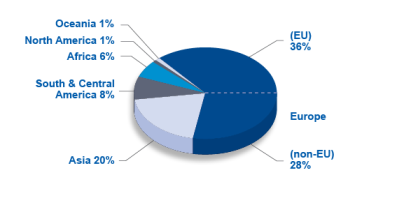
Educator Demographics
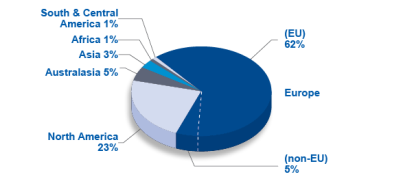
Educator Profile
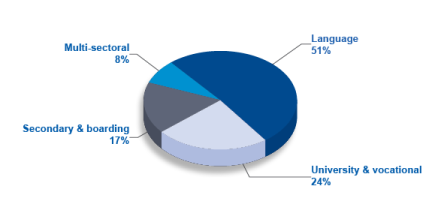
Full ICEF report on the Berlin 2016 event can be found here.
